Aug 18, 2025
Aug 18, 2025
Humans search meaning in life. "Who am I?", "Why am I here?" "What is birth, what is death?" - these questions have forever perplexed humans. Every thinking human confronts these questions at some point in life. The search and the answers are highly personal. A human by instinct wants to make sense of life. S/he wants to search the beyond.

It is good to think of society and the opinion of others in maintenance of interpersonal relations and social cohesion. But an obsession with society, and opinion of others damages the psychological health of an individual.
We must be skilled at dealing with rejection, ridicule and even disdain at times. It is important. It leads us to a fulfilling life. We all love ourselves more than other people and yet we are forever fixed at what others think of us. It is being unfair to ourselves. It is putting ourselves last and others first. We are sick in seeking validation from other people. Looking good in the eyes of other people becomes more important than being real in our own eyes. This is hampering our creativity and our happiness. This is creating a mentally sick population. People are stunted in their personal growth.
The adoration of society is based on the job title, money, possessions, physical strength, looks, language, friends and our fashion quotient. This is what society calls success. And as it is said, nothing succeeds like success. Success brings social validation. This excessive association with outside world is not healthy. It is at the cost of the inner human. Any human, whose interests are all outside her/himself will never feel at peace. S/he will always hanker outside, searching, seeking, craving for more and more. Such a person totally forgets that despite her/his success, s/he is still the same human inside. Outer beauty is useless if inner person does not match that beauty. The inner person must keep pace with outer growth. We are not talking of ascetics here. We are not denying the value of worldly success. The only point is that if the inner person does not evolve, even outer success will leave us poor, dissatisfied and sad. We may amass wealth, titles, houses, and social validation but if the inner human is not improved, we will forever be haunted by misery and pain.
External success feels good and gives happiness however the inner human will always come and stake claim over life, dreams, sleep, personality, and peace.
The inner self is not satisfied with outer possessions; it chases more brilliant things like creativity, personal refinement, spirituality, travel, true connections, art, philosophy, melody and the like. If we ignore the inner self, we may experience suffering, unspeakable restlessness, and incomprehensible unhappiness even among luxuries. Total externalization of life results in incurable suffering. People are not able to understand as to why they are unhappy. The name of this disease is excessive focus on outer glitter and neglect of the inner human.
Literature and history have given brilliant examples where humans have turned the cycle of focus. They have conquered fear of social disdain. These figures have successfully left the lame path of conformity and social slavery.
Don Quixote is one figure from literature who can teach us a lot in this regard. Miguel de Cervantes created this figure taking from reality, fancy and deep psychological insight. This two-part novel gives us lessons which everyone ought to be aware of. It is not Don Quixote who has lost his mind; it is the society which is dysfunctional. Sancho Panza, his Squire and Don defy social norms. They prove a simple point that individuals can be right while the society can be wrong.
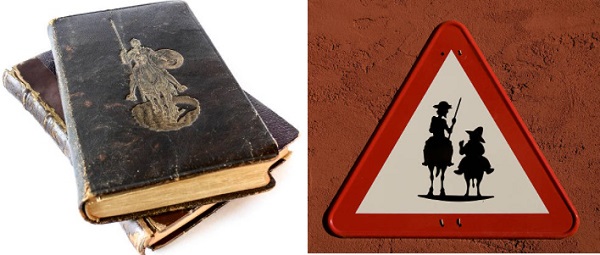
Travel is a symbol of liberation and exploration. Don Quixote discovers himself while he is on the move. Free from the shackles of oppressive social code of conduct, rules and behaviour, Don does what he wants to do. It is important to note that in the course of his travels he meets, interacts with and accepts socially boycotted lovers, prostitutes, escaped convicts, poor people, innkeepers, soldiers, shepherds and priests. Both Don and Sancho have such an enriching life; a life they could never have imagined within the four walls of "normal" society.
Their vision is enhanced. They can see life from the perspective of others. There is lively, real, and vibrant communication. This is how humans ought to be.
There is gain in getting off the path of conformity. One has to be brave, really brave. One has to be adventurous. And then, life rewards One with multiple experiences. To conform to the rule of society is to seek what society calls success and social validation. But to bring order to our psyche, to satisfy our inner urges, to bring harmony to ourselves, strength to our minds and to live an authentic life, we need to re-orient our lives. We should lead a life which heeds the call of the inner human.
We should stop to live with reference to others all the time because it harms us. By externalizing all the time, we defraud ourselves. There is no need to make appearances that follow common opinions. We should care more for our inner truth than public opinion.
If we follow what others say, we will be deeply sick inside. We have to face what we dread, in this case it is public disapproval or ridicule. In the Indian tradition, there is an ancient practice of behaving in socially disapproved ways.
There are a number of cults, occult traditions, Naga groups, Devi followers and others who on purpose defy society. They do things which evoke ridicule. This has been an important part of Indian lore.
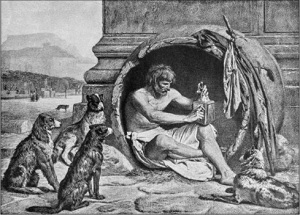 Another figure from history Diogenes is worth me turning here. This Turkish man who lived in Greece approximately three hundred years BC had the grit to defy social norms. He believed that the society was corrupt and confused. The simple lifestyle of the individual is the Supreme virtue. Virtue lies with the individual and not society. He was totally free. He would go wherever he wanted, followed his will to the utmost. Long before Rousseau, it was Diogenes who believed in toughening up against nature. Humans have to face rough nature in order to remain human. Once Alexander said that had he not been who he was, he would have preferred to be Diogenes, a man without any chain.
Another figure from history Diogenes is worth me turning here. This Turkish man who lived in Greece approximately three hundred years BC had the grit to defy social norms. He believed that the society was corrupt and confused. The simple lifestyle of the individual is the Supreme virtue. Virtue lies with the individual and not society. He was totally free. He would go wherever he wanted, followed his will to the utmost. Long before Rousseau, it was Diogenes who believed in toughening up against nature. Humans have to face rough nature in order to remain human. Once Alexander said that had he not been who he was, he would have preferred to be Diogenes, a man without any chain.
Society is ruthless. It tells you what to eat, how to dress, whom to marry, what to think and so on. The individual would be dead. If everybody did what everyone else was doing, there would be no change, no progress. Potential is explored and realized when there is freedom to think and behave in all possible ways. Possibilities should not be killed. So, we can safely say that judgemental people are the worst. They project their self hate on others and keep giving certificates of propriety even when no one asks them to do so. We have to know that the world does not end when someone shames us. No harm comes with the disapproval of others as long as we are comfortable with our actions. If we listen to the inner call, a greater life awaits us. Not to be affected by the comments and opinion of others is a form of freedom.
When others try to hurt or ignore, we may simply say to ourselves that either it is not about ourselves or it is about ourselves. If someone is trying to intimidate due to her or his own complexes or is doing so unknowingly, it is not about us. We may not bother about it. The other possibility is that we need an improvement somewhere. We may analyse ourselves and do it. In any case, we have to give lots of empathy to our own selves. A person who is not kind to her or himself cannot be kind to anyone else. Introspection and thinking are important.
Every human has a dark side. No one is perfect. We have desires, impulses, fantasies stored in our mind. For our good health, we have to integrate that side into the mainstream of our personality. To do that, we have to first accept ourselves as we are. When we accept that we are not perfect, then begins the new journey.
Literature is full of stories and characters who cross boundaries in order to satiate their inner call. Moby Dick, Vanity Fair, Madame Bovary, War and Peace, Crime and Punishment, The Brothers Karamazov, Dead Souls, Bleak House, The Tenant of Wildfell Hall and Moll Flanders are only some outstanding literary works which are based on the reflection of inner human cravings as against strict social norms.
 Moby Dick famously begins with the sentence, "Call me Ishmael." We cannot miss the biblical counterpart as both are social outcasts. The urge to live life on his own terms drives Ishmael to sea. He finds meaning of life in sea. Ahab, of course is at a different level where he is seeking revenge on the white whale who had bitten off his knee at an earlier voyage. At one level, the novel is deeply seated in the inner instincts of humans - the instincts of voyage, adventure, revenge, risk, experience and thrill. Crossing boundaries and living through the elements is a way of life here.
Moby Dick famously begins with the sentence, "Call me Ishmael." We cannot miss the biblical counterpart as both are social outcasts. The urge to live life on his own terms drives Ishmael to sea. He finds meaning of life in sea. Ahab, of course is at a different level where he is seeking revenge on the white whale who had bitten off his knee at an earlier voyage. At one level, the novel is deeply seated in the inner instincts of humans - the instincts of voyage, adventure, revenge, risk, experience and thrill. Crossing boundaries and living through the elements is a way of life here.
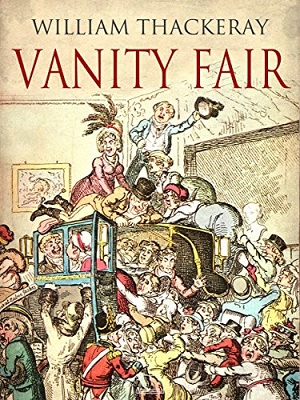 Vanity Fair by Thackeray is yet another example of literature of the highest order which shows the shallowness of humans. I find this novel to be a relentless investigation into human nature. How humans are acting against humans! The duplicity, deceit and double crossing are done under the guise of doing good. Humans are indeed the most poisonous beings who use other humans for power, position and advantages. Thackeray took the name of the place Vanity Fair from John Bunyan who had depicted this place at an itinerary in a pilgrimage. It was a commercial town that came on way to a pilgrimage. We can say that it was Las Vegas of those times. Most of the people bow down to wealth and position even if the wealthy and powerful person is cheap and sinful. Humans worship false values. Even if people know that the aristocrat is not worthy as a human being, they would gather at his service for one meal and some wine. How can we say that society and its values are worth following?
Vanity Fair by Thackeray is yet another example of literature of the highest order which shows the shallowness of humans. I find this novel to be a relentless investigation into human nature. How humans are acting against humans! The duplicity, deceit and double crossing are done under the guise of doing good. Humans are indeed the most poisonous beings who use other humans for power, position and advantages. Thackeray took the name of the place Vanity Fair from John Bunyan who had depicted this place at an itinerary in a pilgrimage. It was a commercial town that came on way to a pilgrimage. We can say that it was Las Vegas of those times. Most of the people bow down to wealth and position even if the wealthy and powerful person is cheap and sinful. Humans worship false values. Even if people know that the aristocrat is not worthy as a human being, they would gather at his service for one meal and some wine. How can we say that society and its values are worth following?
Thackeray has not undermined the value of money, home, clothes and good food but he has effectively shown the futility of making money and power the sole aim of human life. We can see the degradation people undergo to reach the higher strata of society. There is only vanity at Vanity Fair.
This is a long, soul searching novel on the importance of finding meaning in life and the utter futility of social norms.
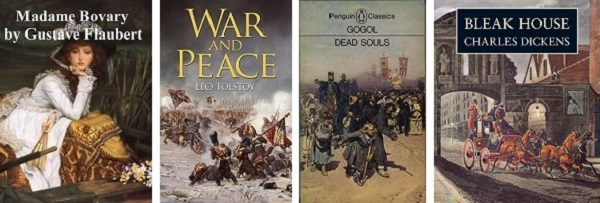
Madame Bovary by Gustave Flaubert is a novel which sharply points out the gap between ideal love, relationship and actual marriage. Flaubert is bold enough to question the age-old institution of marriage, child birth and supposed fulfilment. It is all a mirage.
In War and Peace, Leo Tolstoy has dared to go into spiritual sufferings of humans at the hands of social institutions. Especially the poignant life of Natasha shows challenges of love, the resulting disillusionment, the involved public shame and finally maturity. Natasha goes full cycle of transformation but not before facing social rebuke.
The Brothers Karamazov is blood boiling novel about the moral corruption of society and the institution of family.
Dead Souls by Nikolai Gogol is a unique novel where Chichikov, a dismissed civil servant charms his way into the homes of influential landowners in the name of offering an absurd, strange scheme. Gogol shows how utterly shallow people are and a cunning man can work his way. In the end when he is caught and is facing trial, he shows the powers of exposing the most powerful people of the society. He is asked to leave the town without any trial or punishment which he happily does. The novel is an excellent commentary on strange laws and ways of any given time in any given society. Human made rules are often wrong and absurd.
Charles Dickens is more famous for other novels more than he is known for Bleak House. But perhaps it is Bleak House which best represents his philosophy. Search for meaning, genuine affection, acceptance and love is deep seated in human psyche. It is not an easy search nor is it successful with everyone. And yet, humans hanker after it. For reasons unknown to conscious mind, humans indulge in great risks, rebukes and ramifications just to find meaning and love in life. There is a yearning which defies definition. It is a substantial drive. Passion is both important and dangerous. Yet, this passion for a fulfilling life is important. Search for meaning must go on.
In this novel, passion sometimes is taken to extraordinary levels. Different characters show this urge to devote themselves wholeheartedly to one cause, one purpose. The soul needs excitement of a single goal. It gives meaning to life.
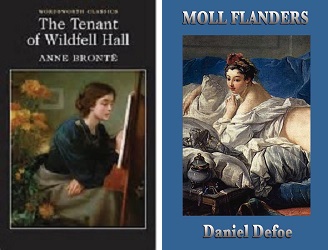 The Tenant of Windfell Hall by Anne Bronte is fine piece depicting the urge to find true meaning of life through love. It is a classical novel set in medieval England where parties, gatherings, balls, letters and diaries work as agents of love. Despite marital status or wealth or any other consideration, hearts that yearn to be together are finally together.
The Tenant of Windfell Hall by Anne Bronte is fine piece depicting the urge to find true meaning of life through love. It is a classical novel set in medieval England where parties, gatherings, balls, letters and diaries work as agents of love. Despite marital status or wealth or any other consideration, hearts that yearn to be together are finally together.
Moll Flenders by Daniel Defoe is study of the reverse process. It talks about a person who has no interior life. Moll is ridden by desire to amass wealth and status. She runs after it in a cold blooded manner. She falls apart as she has no introspection process in place. She has no internal mechanism to fulfil her life.
Humans are a curious mix of social and internal traits. The popular culture of any day encourages us to externalize limitlessly. But that is not how humans are designed. We come in this world with archetypes written all over. That is why we unconsciously connect to music, words and arts. We will not be truly human if we do not go for that search for the meaning of life.
The role of society is important, but it should not overshadow our inner self. No one is perfect. Everyone has a darker side with unbridled desires. We must find a way to give passage to those desires otherwise we will be psychologically sick. In order to conform to social rules, we cannot and should not kill our true self. The process begins with acceptance. Once we accept the way we are, we unleash our true potential. The key is to understand the difference between who we are and who the society wants us to be. We must be clear on that. Most of the social rules are temporary. What was considered right in 18th century is sinful now. Therefore, the educated, aware individual has to know the limitations of social rules. There is no need to pretend to be demigods. Humans are imperfect by nature. Therefore, all that humans have created in the form of social institutions and values is also imperfect. This understanding is vital to the growth of the individual.
References
1. Melville, Herman. Moby Dick. 2014 edition. Amazon Digital Service.
2. Gogol, Nikolai. Dead Souls. 2008 edition. Penguin Classics.
3. Dickens, Charles. Bleak House. 1999 edition. London : Bradbury and Evans.
4. Defoe, Daniel. Moll Flanders. 1998 edition. London: W. R. Chetwood.
5. Bronte, Anne. The Tenant of Windfell Hall. 2000 edition. London: T. C. Newby.
6. Thackeray, William Makepeace. Vanity Fair. 2016 edition. Fingerprint Publishing.
7. Tolstoy, Leo. War and Peace. 2015 edition. Fingerprint Publishing.
8. Jung, Carl. Psychological Types. 2071. New York: Rutledge.
Illustrations (c) istock.com
Images of books from the Web
03-Jul-2021
More by : Prof. Shubha Tiwari

|
Insightful and precise article. The references to literature are exemplary. Multiple reminders about what is really important in life. Humans are the most dangerous creatures on the planet. And being aware of our limitations elevates us to higher planes. Well-written, with multiple lines worthy of being quoted in varied social contexts. |

|
The Ways Of Life In The World! Rating: ★5.0According to natural inclination of mind, many live either emotional life or Intellectual life or spiritual life in the manner and style they like in this world ever; Romantically interested people prefer emotional life in beauty and love of life; Intellectually minded ones prefer knowledge and truth, but spiritual ones love Nature! Living life according to one's nature and doing work to achieve fulfilment In life is what all are trying in the world to have a smooth end for eternal peace; But the slip between the lip and cup no one can escape unless one is careful; Even if one prefers to be so, fate has to permit to go on one's will in the world! History and literature say a lot of stories how and why many have lived in ways That others find it hard to believe and never like to do so by nature or anyway; We can propose many things, but the Creator only decides and disposes all; Though this is a well know preaching, but it has irrefutable meaning in everyone's life! Men may come and men may go, but life goes on here according to The will of Almighty all have to understand and live life accordingly for good! Ramesh T A |

|
Very insightful and thought provoking article regarding exploring self. As it is said peace lies in your own self, liberate yourself from the outer world and try to harmonize between your inner and outer self. |

|
A soulful outpouring of emotions. Simply superb. |

|
Intricately woven insight of the human mind and its quests. The texts explored have universal connects. Human Nature remains the same irrespective of eras and continental demarcations. Desires and aspirations have no cultural, social, racial, religious boundaries. |

|
A deftly written article offering insights into the eternal quest for meaning and happiness in life. Some extremely pertinent issues have been raised and brilliantly illustrated through examples from literary classics. |

|
Rightly said "The only point is that if the inner person does not evolve, even outer success will leave us poor, dissatisfied and sad" The inner peace and happiness is far more important than outer glittering world.. Very insightful article. |

|
Very nice Explanation ma'am . Beautiful picture of the right way of living life. |

|
“Everything can be taken from a man but one thing: the last of the human freedoms—to choose one's attitude in any given set of circumstances, to choose one's own way.” “When we are no longer able to change a situation, we are challenged to change ourselves.” I just arrived at this article through Google Search. This is one of the best articles on commenting. I enjoyed it a lot. Carry on writing such useful stuff. |

|
Many thought provoking sentences ma'am. And the concluding statements were really amazing. It was a good read indeed !! |

|
That's what the whole point is Shivani... Do not sacrifice your inner life for any social compulsion. Do have a life of your choice. Follow your passion. Do what makes you happy. Decide for yourself. |

|
The article is much helpful but mam I want to know one thing Is it necessary for living, peacefully happy life we have to think about the society norms and rules??? Can't we stay happy without thinking about society norms.?? |